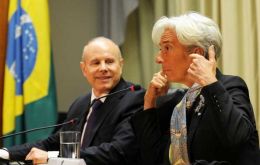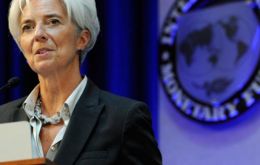MercoPress. South Atlantic News Agency
Tag: Greece
-
Saturday, November 2nd 2013 - 15:55 UTC
Unemployment in Euro-zone remained at record high 12.2% in September

The unemployment rate in the 17-nation Euro-zone remained at a record high of 12.2% in September as the bloc’s recent recovery failed to generate new jobs, official data shows. The number rose by 60,000 to 19.45 million, while the jobless rate for those aged under 25 edged up to 24.1% from 24% in August, according to Eurostat, the European Union’s statistics agency.
-
Friday, August 2nd 2013 - 03:55 UTC
Brazil supports IMF aid to Greece and summons delegate back home to explain

Brazil on Thursday expressed support for the IMF latest aid package for Greece, disavowing its IMF delegate who abstained in a vote on the issue. Finance Minister Guido Mantega spoke with IMF chief Christine Lagarde and backed the Fund's decision to release 1.7 billion Euros in rescue loans to ailing Greece Monday, his spokesman said.
-
Thursday, August 1st 2013 - 02:59 UTC
Brazil criticizes IMF for latest aid to Greece: worst fears could be confirmed

A group of Latin American countries refused to back an IMF move this week to keep bankrolling Greece, citing risks of non-repayment, and the Fund itself said Athens might need faster debt relief from Europe.
-
Saturday, June 15th 2013 - 04:06 UTC
Greeks and Spaniards move north in growing numbers looking for jobs, says OECD

Greeks and Spaniards are moving to northern Europe in growing numbers, the Organization for Economic Cooperation and Development (OECD) said this week, as soaring unemployment rates and fiscal austerity erode living standards in the south.
-
Thursday, June 6th 2013 - 23:21 UTC
IMF admits mistakes in Greece, fearing the spill of problems to the rest of Europe

The International Monetary Fund admitted it had to lower its normal standards for debt sustainability to bail out Greece, and its projections for the Greek economy may have been overly optimistic.
-
Friday, March 1st 2013 - 13:29 UTC
Euro-zone unemployment reaching 12%; Greece and Spain above 26%

Unemployment in the Euro zone reached a new high of 11.9% in January, as an additional 201,000 people joined the jobless ranks in the crisis-battered bloc, latest data showed Friday. The unemployment rate has been increasing relentlessly since the middle of 2011.
-
Friday, December 14th 2012 - 07:16 UTC
EU reaches landmark deal to make the ECB the top banking supervisor

The European Union reached a landmark deal on Thursday to make the European Central Bank the bloc's top banking supervisor, giving EU leaders greater confidence that they are gaining the upper hand over the Euro zone's debt crisis.
-
Thursday, October 11th 2012 - 23:28 UTC
IMF asks for “a bit more time” for Greece and Spain but Germany says it will affect confidence

The IMF on Thursday backed giving debt-burdened Greece and Spain more time to reduce their budget deficits, cautioning that cutting too far, too fast would do more harm than good.
-
Tuesday, September 4th 2012 - 01:17 UTC
Since 2003 an estimated 261bn dollars have fled from Greece, says NGO

Greek nationals have deposited overseas an estimate 261 billion dollars from illegal activities, from tax evasion and elusion to criminal actions or simple from rampant corruption, according to economist and head of the Non Government Organization, Global Financial Integrity, Raymond Baker.
-
Tuesday, September 4th 2012 - 00:31 UTC
Poll shows Germans want Greece out of the Euro; doubts about reforms’ implementation

Only about a quarter of ordinary Germans are in favor of debt-stricken Greece remaining in the Euro area, a poll published by the Financial Times on Monday indicated. It revealed strong reluctance to grant Greece yet another bailout installment.
